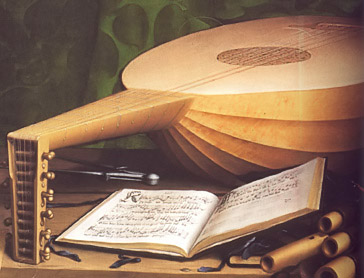
LUTE CAMERATA
LEVEL FIVE
home
Level one: A good sound. Know what they knew, and practice. Tuning. Simple pieces, basic technique. Beginning notation. Throw away your solo CDs.
Level two: books of songs; simple scores, two clefs. Jack & Joan. Simple pieces and songs from both Tab and keyboard notation. The grand rotation.
Level three: basic singing, basic sight-reading; intermediate musicianship.
Level Four: The art of accompanying. Ensemble skills. Medium to high difficulty part songs.
Level five: the great solos and real renaissance ornaments; complex scores, clefs. Different Tab versions, singing from TAB. Arranging. The art of orchestra playing. Advanced rhythms such as late 14th century music and pieces by Tye and Baldwin.
Level Six: True professional, thorough knowledge of the middle ages, renaissance and baroque. All clefs. Al scores. All solos. All songs.
Still under construction. To be completed August 2007 Level Five: Diverse Excellence & Knowledge |
At level five, you are expected to present professional skills, which include networking skills. You should have someone trained in the art of resume building go over your portfolio. You should be able to play recitals from memory. You should have a CD, video and an agent. Many festivals will not consider you without an agent. You should learn the great solo pieces, of which there are many, and learn to apply correctly the great books of ornamentaion from Ganassi, Ortiz, Bassano, and so on. This study will take some years, and most lute players never learn it. Study with a cornetto or recorder player who has made ornamnentation a specialty, and use my online practice examples. You should be able to sing any part in tablature, as the musicians of the renaissance and baroque were able to do this easily, and, inded, published songs in which the vocal part is in tablature. You should be able to read English, French, Spanish and German tablature, and be able to transnotate any of these into keyboard notaion and back into tablature, as well as transpose any of these by tone. To work professionally, you must know how to play in an orchestra. Being attentive, watching the conductor, preparing your music & page turns, all basic stuff, yet most lute players are woefully unprepared for orchestra work. Buy a Handel opera score and CD set: learn the whole work, play along with the recording, in tempo. You MUST get a few lessons in orchestra playing and ettiquette before appearing for the first time with an orchestra, as you are essentially auditioning for everyone in the room. Be able to play on the beat, neither ahead nor behind. Pay careful attention to transposing parts such as the horns, trumpets, and even recorders. Play through the Green Apel book & the Red Apel book. Play pieces by Tye and Baldwin.
|